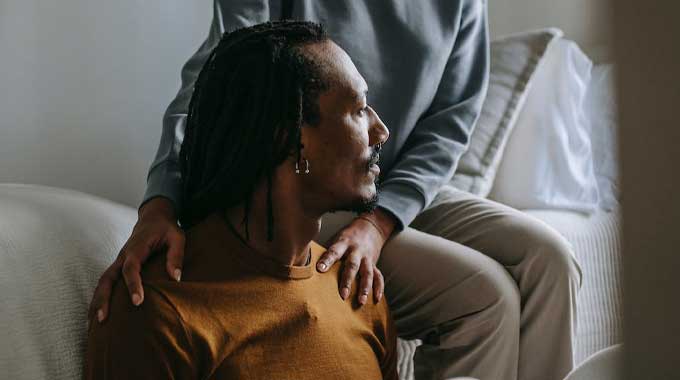Heroin is a potent opioid and taking it can quickly lead to the development of an addiction. In 2017, the US Department of Health and Human Services announced that the opioid crisis was a public health emergency in the United States. This was due to the widespread misuse of prescription opioids and illicit drugs such as heroin.
If you are worried that you or a loved one has a problem with drug use, it is important to understand addiction and how it develops. The earlier you catch the signs and symptoms of heroin abuse, the sooner the recovery journey can begin. This blog outlines the physical and behavioral symptoms to look out for and the options for treatment. Understanding heroin addiction is the key to regaining sobriety.
What Is Heroin?
Heroin is a semi-synthetic drug, which means that it is synthesized from a naturally occurring substance, in this case, morphine. By the time heroin acts in your brain, it has been broken back down into morphine. However, despite acting as morphine it is far more potent. This is because heroin passes across the blood-brain barrier faster than morphine, so a higher concentration of it builds up. Heroin causes a faster and more intense high.
Heroin is a Schedule I Controlled Substance and therefore is seen to be a highly addictive drug with no recognized medical use. It can only be found in illicit forms, so it is difficult to know the potency of the batch you are taking and whether there are any impurities. This can make taking heroin very dangerous. An impurity that is becoming more common is fentanyl. This is an opioid that is about 50 times more potent than heroin. Just 2 mg of fentanyl can cause an overdose. Synthetic opioids, primarily fentanyl, are currently the leading cause of overdose deaths.
Heroin Addiction
Heroin addiction becomes more likely the more you partake in substance abuse. Heroin users may start by snorting heroin every now and then with friends, but addiction can develop quickly due to its potency. According to the National Institute on Drug Abuse, addiction is a brain disorder that causes you to lose control over your substance use and continue to use despite negative consequences. This is why one of the effects of heroin addiction is being unable to stop heroin abuse without appropriate medical support.
Addiction does not affect everyone equally. There are causes and risk factors that make one person more likely than another person to develop a substance abuse disorder. These risk factors include genetics and family history, neglect and abuse in childhood, early exposure to drug use, and experiencing mental illnesses.
The National Institute on Drug Abuse reports that co-occurring disorders such as anxiety disorders and other mental health conditions occur at a high rate among people who abuse substances. One study found that more than 60 percent of adolescents registered in community treatment programs also had mental illnesses.
Heroin users are stigmatized by some people in society who blame individuals for their addictions without understanding the causes and risk factors that lead to substance abuse. It is important not to stigmatize those who suffer from an addiction, just like you would not blame someone suffering from another disease.
Signs and Symptoms of Heroin Abuse and Addiction
The sooner you recognize a heroin use problem in yourself the better. Acknowledging the existence of a heroin abuse issue is the first step that has to be taken before seeking medical support. It is, therefore, useful to understand the signs and symptoms of heroin abuse as well as addiction. Common symptoms of heroin abuse include the following.
- Decreased heart rate and breathing
- Poor coordination
- Decreased cognitive function
- Constipation
- Depression
- Lethargy
It is not always possible to recognize signs of heroin abuse before addiction occurs. If you or a loved one has an addiction it will show itself through behavioral symptoms. Signs of addiction include the following.
- Secretiveness
- Withdrawing from loved ones
- Losing control over heroin use
- Risk-taking such as driving under the influence
- Neglecting personal hygiene and self-care
- Trying to quit and not managing
- Developing tolerance to heroin
It is important to also know how to recognize the symptoms, signs, and effects of a heroin overdose. These are the same as for any opioid overdose.
- Low blood pressure and weak pulse
- Bluish fingertips and lips
- Difficulty breathing and even not being able to breath
- Delirium
- Loss of consciousness
Call 911 immediately if you see a person experiencing the above symptoms. You can also put them in the recovery position if they are unconscious, so they do not choke if they vomit. When the medics arrive, they can administer naloxone to treat the heroin overdose. This is a drug that rapidly reverses the effects of an overdose of any opioid.
Heroin Addiction Treatment
Recognizing the symptoms of heroin addiction in yourself is the first step in accepting that you want to abuse heroin no longer. The next is to acknowledge that you want to seek treatment. It is highly recommended that you seek medical care at a treatment center in order to ease the unpleasant withdrawal symptoms that occur when heroin use is stopped. Medical professionals will be able to ensure that feel looked after and cared for.
One recovery option as you go through heroin withdrawal is to receive outpatient treatment. This is where you undergo detox from home but visit a treatment center in the day or evenings. You will still receive medical support but will not have access to 24/7 monitoring.
With both inpatient and outpatient treatment, you can be prescribed medication to help you deal with withdrawal symptoms. Common medications include:
- Methadone – an opioid that prevents heroin withdrawal symptoms.
- Buprenorphine – an opioid that blocks the effect of other opioids. It is easier to taper off than methadone after treatment is over.
If you are struggling with a heroin addiction we are here to help you at Cornerstone. We believe that a safe and non-judgmental environment is vital for you to recover. We also believe that it is important to focus on your whole being, your body, mind, and spirit. If you only focus on the body you will not deal with the reasons that you were taking heroin or why you may start taking it again. We, therefore, offer a range of program lengths to give you the time you need to recover. You could stay with us for months or even two years depending on what is right for you.
When you come to us we will assess what needs you have. For example, if you are suffering from a co-occurring disorder (a mental health condition as well as an addiction), your treatment will be different than if you only suffer from an addiction. Together we will make a program that suits your needs. Some of our options include:
- Medication-assisted treatment
- Individual, interpersonal, and group therapies
- Twelve-step program support groups
- Exercise
- Nutritious meals
Get in contact today to find out more. We look forward to hearing from you so you can start your recovery journey with us.









